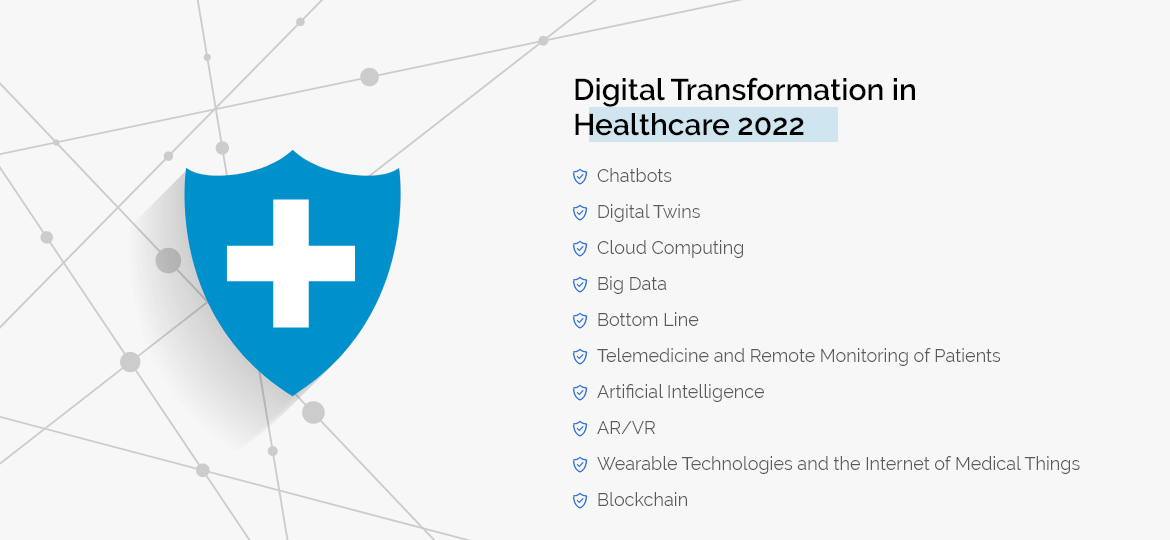
Today, the Coronavirus pandemic morphed the way we deliver and receive healthcare since 2020. In 2021, we witnessed more changes, thanks to the vaccine and then the variants. There have been innumerable challenges that healthcare providers have had to face while trying to administer treatment to patients for multiple conditions virtually.
However, we have also witnessed that technological and digital transformation has proven to strengthen the backbone of healthcare. This decade belongs to the digitization of healthcare and reforms based on technological solutions. Technological changes in healthcare in the last 10 years such as remote viewing, virtual consultation, and intelligent diagnostics have been implemented across the industry with an aim to enhance and facilitate better medical services. Today, we’re going to take a look at the trends to look forward to in 2022 for the healthcare industry.
What Is Digital Transformation in Healthcare Referring to?
Digital transformation is a collection of the newest innovations and changes in the world of digital technologies that have the capacity to change the way we perform healthcare operations on a day-to-day basis. The foundation of this change is employing the help of the latest modern technology like Artificial Intelligence, Machine Learning, the Internet of Things, and carious Cloud-based technologies.
The newest digital transformation in healthcare definition overlooks the consolidation of healthcare data, patient records, prescription ders, and other information that can be handled more effectively, thanks to today’s technological reforms in the healthcare sector. IoT devices, real-time patient monitoring, wearables, and another digital tech apart from other transformational technologies will pave the way for better services and operations.
Digital Transformation in Healthcare 2022

Jump Down:
1. Telemedicine and Remote Monitoring of Patients
2. Artificial Intelligence
3. AR/VR
4. Wearable Technologies and the Internet of Medical Things
5. Blockchain
6. Chatbots
7. Digital Twins
8. Cloud Computing
9. Big Data
If you’re curious to know about the benefits of digital transformation in healthcare and what the trends consist of, take a look at what this year brings to the healthcare industry with the latest technologies.
1. Telemedicine and Remote Monitoring of Patients
Telemedicine does away with the need to perform in-person visits to faraway healthcare specialists. This reform uses wearable devices and software to hold real-time appointments using just your smartphone, notebook, laptop, or tablet with the help of an internet connection. The diagnostic services are highly efficient and can be used for a primary check-up no matter where you are located.
2. Artificial Intelligence
Artificial Intelligence has several benefits in the healthcare system: it guarantees quick diagnosis and expedites the test results up to 150 times quicker than human testing speeds. AI can help in curating personalized treatment plans, prescriptions and prevent theft of identity for scheduled drug trafficking or abuse.
AI can streamline information processing and decision-making by improving the quality of services a doctor can provide with the help of technology. AI can also help the pharmaceutical industry to extensively test and research their medicines before curating ones that have a wide efficacy, speeding up treatments.
3. AR/VR
The use of augmented reality and virtual reality was like a healthcare sci-fi dream that was far-fetched. Today, they are as real as the phones we hold in our hands.
AR and VR are bringing a promise to healthcare by improving upon upcoming treatment ideas by testing them out before using them on patients. Mock surgeries using VR and AR are going to be revolutionary for medical school students, giving them a chance to explore treatment options extensively without the use of cadavers. The realistic 3D imaging of organs, bones, and tissues will also help researchers and healthcare providers to test drugs virtually to find the effects on virtual patients. We also have upcoming organs-on-a-chip which can lower the rates of animal testing and fast-forward clinical trials.
Apart from teaching medical students and performing mock surgeries, both technologies play a pivotal role in therapy.
4. Wearable Technologies and the Internet of Medical Things
The Internet of Things (IoT) is transforming to suit the needs of the healthcare industry rapidly, thereby making medicine more efficient. The Internet of Medical Things (IoMT) is a classification of the IoT curated by a grid of internet-connected machines. Such devices are remotely controlled using software and are connected to the infrastructure so that healthcare practitioners can easily send and receive patient records from convenient touchpoints.
5. Blockchain
The availability and authenticity of patient data and the medical industry are essential. This brings the need for blockchain technology more importance because of its public yet secure nature. It can facilitate safe and convenient access to the medical records of a patient based on access using a public key.
6. Chatbots
Many healthcare facilities have already employed the assistance of intelligent chatbots in the mission to provide excellent medical attention to their customers. From setting up appointments, prescription reminders, and other secondary healthcare due diligence, these chatbots can help lower the pressure on the staff and doctors and streamline services.
7. Digital Twins
Digital twins are a technology that bridges the gap between the digital and physical worlds, by replicating the direct copy of dynamic models, including the human body. While experimental treatments can have their own risks, using the digital twin of a patient or a series of participants in clinical trials can help in making medical breakthroughs without risking the lives of people or further animal testing.
8. Cloud Computing
One day or the other, we will have to completely do away with a paper-based medical history of a patient. Cloud computing has the capacity to store such data with the help of cloud service providers. This can enable healthcare establishments and professionals to use their internal resources more efficiently and improve their services due to quick access to such records while saving physical storage space.
9. Big Data
There are many instances of incorporating the use of big data in the healthcare sector. We can use it to intercept epidemics and create a detailed record for patients under treatment. Big data can also perform predictive analysis by gathering the medical history of a family. One of the best aspects is that it can reduce medical expenses for both parties involved, treat chronic ailments and contribute to preventive healthcare. When integrated with AI-based technologies, big data can perform miracles for people that were once just dreams.
Related: What Are The Top 7 Digital Health Technologies Trends for 2020
Bottom Line
The new technologies can deliver deeply personalized healthcare experiences for patients while healthcare service providers can easily adapt using such technologies to improve their processes. Healthcare establishments can develop a digital institution that focuses on using the newest technologies by incorporating fragmented data available from social healthcare records to provide better treatment options, home care, self-monitoring, and other traditional aspects of medicine.
Building an efficient healthcare app is paramount in this decade, more than anything. To begin with the process of coming up with the best modalities for your customers, you need to Hire Healthcare App Developer that understands the industry and your needs. Concetto Labs is your best bet for a Healthcare App Development Company and will help you reform your services. To know more about how our services can help you overcome the Healthcare digital transformation challenges, contact us today.
Looking For Healthcare App Development Company




 Indonesia
Indonesia
 Botswana
Botswana
 USA
USA
 Italy
Italy
 Panama
Panama




 USA
USA UK
UK Saudi Arabia
Saudi Arabia Norway
Norway India
India Australia
Australia